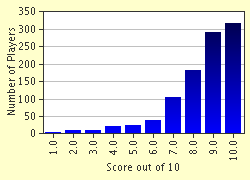Quiz Answer Key and Fun Facts
1. From a Lancashire poem : 'When I put little Sally to bed, Hoo cried 'cose her feyther weren't theer, So aw kiss'd little thing, an' aw said Thae'd bring her a ribbin fro' th'fair.'- What is meant by "Hoo" ?
2. From Dorset. 'Well we staggered whome at 'alf-past dree, A-zinging all the way. Me 'usband gi' I a kiss The vust since me wedding-day.' Which of these statements 'agrees' with a portion of what the text says?
3. From Northumberland. 'There idden many can sheary now' Which of these four options renders this line the most correctly?
4. From Lincolnshire. 'Cum in, lass. A'm real pleased to see ya, Yah're welcome as flowers in Maay. Cum an' sit yersen down on the soafy.'- Means?
5. From a poem by Samuel Laycock, born in Yorkshire but having lived in Cheshire and Lancashire. The poem is dedicated to a new-born baby. 'But tho' we've childer two or three We'll mak' a bit of reawm for thee, Bless thee, lad, Th'art prettiest brid we have in th'nest.' What is meant by reawm?
6. From 'Essex Ballads' by Charles Benham. 'There's olluz summat. When tha's wet The corn get laid, the hay git sp'iled And when th's dry the lan' get set.' What's the general gist of these lines?
7. From Norfolk dialect poet John Kett. 'Then there's the baads; they allus sing their best When I go paast the barn agen the wood. Ah, more'n once I'a stopped there jus' to hear Their lovely songs what fill the evenin' air. That don't corst naathin', and that dew yer good.' Baads means?
8. From Wiltshire: 'When I were jus' a leetle bwoy I met an old man in tha street 'Ee zeemed ta be quite pleasant enuff 'Is chat an 'iz zmyle wer sweet. But I 'membered wat me mum 'ad zed, "Never taa ztop an' talk to a stranger", But 'ee zeemed ta know wat I wer thinking 'Coz 'ee zed: "My bwoy, there is noa danger." Then 'ee put iz hand on my yarm, Az a smyle 'cross his face did zet, Zaying, "Ther' noa zich thing az strangers; Ther' only vrends you 'ave n't met."' What is the general message of this poem?
9. From Eastern Counties: I've lost my pal, 'e 's the best in all the tahn, But don't you fink 'im dead, becos 'e ain't. But since he's wed, 'e 'as ter nuckle dahn, It's enough ter wex the temper of a saint. 'E's a brewer's drayman, wiv a leg of mutton fist, An' as strong as a bullick or an horse. Yet in 'er 'ands 'e's like a little kid, Oh! I wish as I could get him a divorce.
10. From Lincolnshire: The Poacher But I'd rayther be down wheare th'fire An' brimstun foriver bo'ns, An' just go around wi' a bucket An give fook drink by to'ns- Then sit i' yon stright maade heaven Wheare saints and' angels sing', An' niver hear the pheasant craw, Nor th' skirr o' a partridge wing; Wheare ther' isn't a bank nor a plantin'-side Where rabbits cum oot an' play An' stamps wi'ther' feet o'un moonleet neet, Wheare it's warm o' the coudest day.
Source: Author
flem-ish
This quiz was reviewed by FunTrivia editor
agony before going online.
Any errors found in FunTrivia content are routinely corrected through our feedback system.

